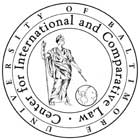Related Research Articles

The Family Educational Rights and Privacy Act of 1974 is a United States federal law that governs the access to educational information and records by public entities such as potential employers, publicly funded educational institutions, and foreign governments. The act is also referred to as the Buckley Amendment, for one of its proponents, Senator James L. Buckley of New York.

Loyola Law School is the law school of Loyola Marymount University, a private Catholic university in Los Angeles, California. Loyola was established in 1920.
Bruce P. Frohnen is a Professor of Law at Ohio Northern University College of Law, where he teaches courses in Public and Constitutional Law, Jurisprudence, and Legal Profession.
The Denver Law Review is a law journal published by the students of the University of Denver Sturm College of Law. It was established in 1923 as the Denver Bar Association Record. In 1928, the journal was renamed Dicta and in 1968 it was renamed Denver Law Center Journal. The journal changed its name to Denver University Law Review in 1985. It adopted its current name in 2015. The College of Law began co-publishing the law review in 1949 and became the sole publisher in 1966.
The Wisconsin Law Review is a bimonthly law review published by students at the University of Wisconsin Law School. One issue each year is generally dedicated to a symposium or special topic.

The University of Pennsylvania Journal of International Law is a scholarly journal focusing on issues of international law, international relations, transnational law and comparative law. The Journal is published quarterly by an organization of second and third year law students at the University of Pennsylvania Law School. The journal is one of seven major scholarly journals at the University of Pennsylvania Law School and one of the top ten international law journals in the United States both based on citations and by impact.

Emory University School of Law is the law school of Emory University, a private research university in Atlanta, Georgia. It was founded in 1916 and was the first law school in Georgia to be granted membership in the American Association of Law Schools.

Saint Louis University School of Law, also known as SLU Law, is the law school affiliated with Saint Louis University, a private Jesuit research university in Saint Louis, Missouri. The school has been American Bar Association approved since 1924 and is a member of the Association of American Law Schools.
The Fordham International Law Journal is a student-run law journal associated with the Fordham University School of Law. According to the Washington and Lee journal rankings, it is the 4th most cited student-edited international and comparative law journal in the United States. The current editor-in-chief is William Russell.
The Chicago Journal of International Law is a semiannual, student-edited law review published by the University of Chicago Law School since spring 2000. The journal publishes articles covering international law, international relations, and related policy issues. Its articles are often interdisciplinary in focus, and the journal's format allows it to examine international legal issues in a broader cultural and political context. The Chicago Journal of International Law is one of the three student-edited law journals published at the University of Chicago Law School.
The Suffolk Transnational Law Review is a triannual law review published at Suffolk University Law School. It covers contemporary international legal issues. It was established in 1976. The journal is organized and operated by students.
The Willamette Law Review is a law review academic journal published by Willamette University College of Law in Salem, Oregon, United States. Founded in 1959 as a successor to an earlier publication, the triannual publication is housed in the Oregon Civic Justice Center. The journal is edited by students of the law school with oversight by the college's faculty. As of 2019, the Willamette Law Review has published a total of 55 volumes.
The Harvard Journal on Legislation is a journal of legal scholarship published by students at Harvard Law School.
The Annual Bulletin of the Comparative Law Bureau of the American Bar Association (ABA) was a U.S. specialty law journal. The first comparative law journal in the United States, it surveyed foreign legislation and legal literature. Circulated to all ABA members, it was absorbed in 1915 by the newly formed American Bar Association Journal.
The George Mason University Civil Rights Law Journal is a law review run by students at the George Mason University School of Law. It published one or two issues each academic year from 1990 to 2006–2007, and three issues each year since then. The journal is published by William S. Hein & Co.
The Georgetown Journal of International Law is a law review published by Georgetown University Law Center. It is among the world's most influential international law journals.

Anne Marie Lofaso is Associate Dean for Faculty Research and Development and a professor at the West Virginia University College of Law. In 2010, she was named WVU College of Law Professor of the Year. She is also a four-time recipient of the WVU College of Law faculty-scholarship award.
Hastings International and Comparative Law Review (HICLR) is one of the oldest international law journals in the United States, and was established in 1976. It is published by law students through the O'Brien Center for Scholarly Publication, the publishing foundation for UC Hastings. HICLR publishes articles on the topics of international, comparative, and foreign law. It also publishes student-written work on recent developments in international law. The current Editor-in-Chief is Jacklin Lee.

The University of Baltimore School of Law's Center for International and Comparative Law (CICL), established in 1994, sponsors research, publication, teaching, and the dissemination of knowledge about international legal issues, with special emphasis on human rights, democracy, intellectual property, and international business transactions. Initiatives are coordinated with other University System of Maryland institutions through the System Associates Program and the John Sumner Stead Colloquium on International and Comparative Law. The center hosts a number of visiting lecturers, events, and colloquia throughout the year, including Visiting Fellows in International and Comparative Law on year- or semester-long visits. The two primary public programs are the annual John Sumner Stead Lecture on International and Comparative Law and the Stead Seminar on International and Comparative Law.
Ewa Plonowska Ziarek is the Julian Park Professor of Comparative Literature at The State University of New York at Buffalo. She has a major interest in engaging with other scholars on their own terms, and believes that a model of dissensus in philosophy, rather than the traditional consensus model, may produce highly valuable results.
References
- 1 2 3 "Emory International Law Review". Emory School of Law.
- ↑ See generally Emory International Law Review, Emory School of Law, https://law.emory.edu/eilr/content/index.html (archiving past volumes of the journal).
- ↑ See Alizé Mitchell, EILR 2021 Symposium (Feb. 9, 2021), https://www.flipsnack.com/Emoryinternationallawreviewsymposium2021/eilr-2021-symposium.html.
- ↑ See Erik Kim, EILR 2022 Symposium (Mar. 26, 2022), https://www.flipsnack.com/89CC78BBDC9/2022-eilr-symposium-program.html
- ↑ W&L Law Journal Rankings, https://managementtools4.wlu.edu/LawJournals/Default.aspx
- ↑ See 1 EMORY J. INT'L DISP. RESOL. 1 (1986); 2 EMORY J. INT'L DISP. RESOL. 1 (1987); 3 EMORY J. INT'L DISP. RESOL. 1 (1988)